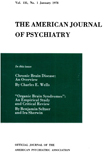Reversal of tricyclic-overdosage-induced central anticholinergic syndrome by physostigmine
Abstract
Although there is evidence that the delirium, stupor, coma, and seizure- like activity seen in overdosage with tricyclic antidepressants and antiparkinson drugs are due to the central anticholinergic activity of these agents, patients with overdosage of these drugs are still frequently misdiagnosed. The authors present a case of reversal of anticholinergic-drug-induced prolonged coma, myoclonus, and choreoathetosis by physostigmine. This report supports the anticholinergic basis of the clinical manifestations of such overdosages, provides information on the role of acetylcholine and dopamine in psychiatric and movement disorders, and illustrates dramatically the need for accurate diagnosis and treatment.
Access content
To read the fulltext, please use one of the options below to sign in or purchase access.- Personal login
- Institutional Login
- Sign in via OpenAthens
- Register for access
-
Please login/register if you wish to pair your device and check access availability.
Not a subscriber?
PsychiatryOnline subscription options offer access to the DSM-5 library, books, journals, CME, and patient resources. This all-in-one virtual library provides psychiatrists and mental health professionals with key resources for diagnosis, treatment, research, and professional development.
Need more help? PsychiatryOnline Customer Service may be reached by emailing [email protected] or by calling 800-368-5777 (in the U.S.) or 703-907-7322 (outside the U.S.).



